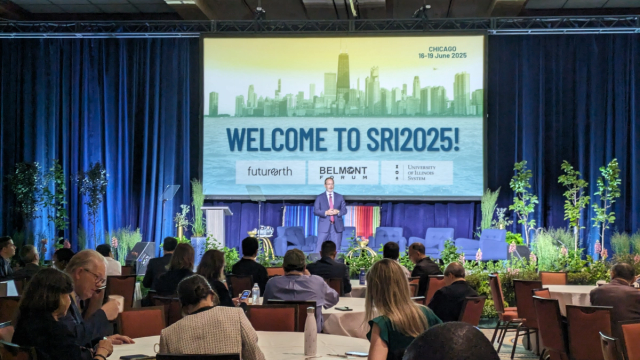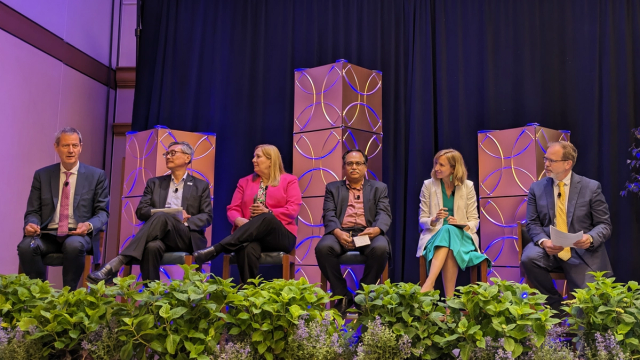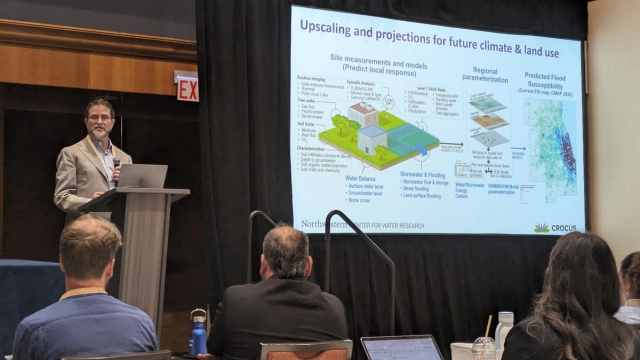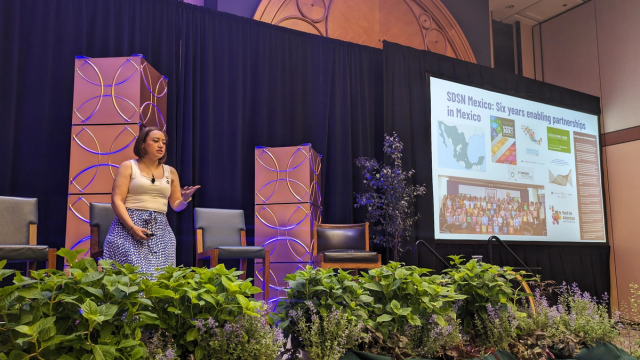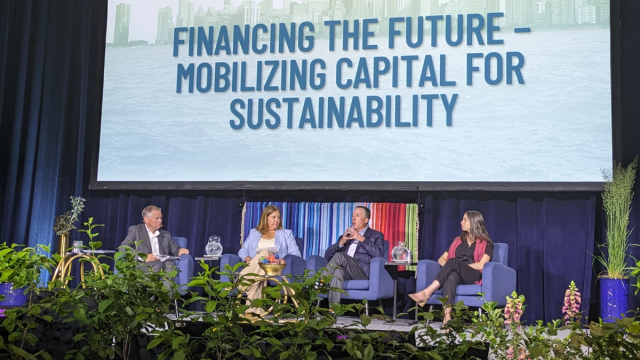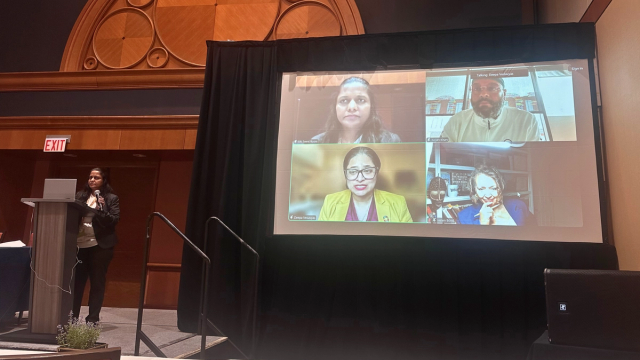Global Sustainability in Focus: A Recap of the SRI Congress 2025
From June 16 to 19, 2025, the UN Sustainable Development Solutions Network (SDSN) took part in the Sustainability Research and Innovation (SRI) Congress — one of the world’s leading academic conferences on evidence-based, actionable, and inclusive approaches to sustainability.
As a Lead Partner, the SDSN led a series of sessions, exploring how transformative change requires new ways of working across disciplines, sectors, and geographies. Key themes emerged: the importance of co-designing solutions by empowering communities; the growing influence of AI and the urgent need to guide its use responsibly; the necessity of reshaping university structures to better support transdisciplinary collaboration; and the critical role of science diplomacy, which must be fully integrated with communication efforts rather than treated as an afterthought.
SDSN Programming at SRI2025
Tuesday, June 17
Networks of Impact: The Role of Higher Education & Research Institutions in Advancing Sustainability Solutions
In this session, the SDSN was invited to join other university and network leaders to discuss the crucial role higher education and research institutions play in advancing the Sustainable Development Goals (SDGs) globally. The session emphasized the need for international and interdisciplinary collaboration, calling for a "coalition of the willing" across sectors and disciplines to reform frameworks for research and cooperation.
Maria Cortes-Puch, the SDSN’s VP of Networks, highlighted the organization’s efforts to mobilize universities, create tools, and foster networks that support SDG implementation. The panel also addressed the challenges posed by rising nationalism, research security concerns, and reduced funding, emphasizing the need to reform institutional structures and incentives to support collaborative, transdisciplinary work. Despite these difficulties, panelists expressed optimism, particularly regarding youth perspectives on tackling social issues, which signals a potential shift in higher education's role in sustainable development.
STAR Talks
This session showcased global sustainability initiatives, including the SDSN’s Council of Engineers for the Energy Transition (CEET). Representing the Council, Program Manager Liz Nelson delivered a STAR Talk titled “Leveraging Engineering Perspectives for the Global Energy Transition.” Her presentation highlighted the CEET’s efforts to advance SDG 7 (Affordable and Clean Energy) by integrating engineering expertise into energy system planning and policy.
Nelson emphasized the critical role of engineering perspectives in developing technically sound pathways to decarbonization and systemic transformation. She underscored the CEET’s inclusive structure — operating under the UN Secretary-General — with representation from every global region, gender parity, and a broad spectrum of technical disciplines. The talk concluded with a compelling call to action: for the UN system and global engineering community to dismantle silos, foster interdisciplinary collaboration, and embed technical expertise at the heart of energy transition strategies for a just and sustainable future.
Pathways to Climate Resilience
Focusing on practical responses to climate change, “Pathways to Climate Resilience: Innovative Adaptation Strategies for a Sustainable Future,” detailed cutting-edge solutions from EU-funded projects ARSINOE, CARMINE, and IMPETUS. The session was moderated by the SDSN’s Maria Cortes-Puch and featured four distinguished speakers.
- Dr. Sorin Cheval, Project Coordinator, CARMINE project and Senior Climatologist, National Meteorological Administration of Romania
- Wisse Beets, expert on climate resilient cities, Nelen & Schuurmans
- Dr. Conrad Landis, Post-Doc Researcher, Research Laboratory on Socio-Economic and Environmental Sustainability of Athens University of Economics and Business (AUEB)
- Dr. Aaron Packman, Professor of Civil and Environmental Engineering, Northwestern University and Co-Director of the Northwestern Center for Water Research and the U.S.-Israel Collaborative Water-Energy Research Center
Dr. Cheval presented the CARMINE project, an initiative focused on strengthening climate-resilient development in Europe’s metropolitan regions. The project comprises 32 partners from 11 countries across eight European Case Study Areas, with stakeholders spanning science, policy, communities, and local authorities. At its core are Living Labs (LLs), collaborative spaces for stakeholders to co-design adaptation strategies, and Digital Twins (DTs), simulating real-time climate risks and interventions tailored to each metropolitan context.
Beets then discussed a practical and innovative Heat Awareness System, developed as part of the IMPETUS project to strengthen protection for cities from extreme heat. The web-based application identifies heat stress hotspots within cities and enables users to design and evaluate adaptation measures in a game-like tool. This allows municipalities, architects, urban planners, and citizens to explore how choices in urban planning have a significant influence on experienced heat stress. Already implemented by more than ten municipalities in the Netherlands, it can also easily be translated abroad.
Dr. Landis presented the Hybrid Financial-Sustainability Model created for the ARSINOE Project to monitor short-term and long-term Environmental, Social, and Governance (ESG) targets. Conceived by AUEB, the model combines sustainability and financial metrics to measure certain Key Performance Indicators (KPIs) relating to critical ESG and SDG issues such as water-use, labor conditions, and responsible investment. The model enables the evaluation of SDG performance both at the company level and throughout the full value chain. The ARSINOE Mediterranean Ports Case Study served as a pilot for implementing the model by identifying 188 sustainability and financial KPIs across 13 material issues, mapping them to ESG and SDG goals, and benchmarking performance against top global port authorities.
Finally, Dr. Packman described the research undertaken by the CROCUS Urban Integrated Field Lab to explore the effect of different types of urban greenspaces on flooding and water movement. By monitoring 10 green spaces across Chicago, CROCUS collected detailed data on water levels, soil moisture, and energy flow to understand how parks, schoolyards, and natural areas help absorb stormwater — even in areas with shallow groundwater. These findings show that expanding and connecting urban green spaces could be a powerful strategy for reducing flood risk and building more resilient cities.
SDSN Mexico as a Facilitator of Collaborations on Sustainable Development in Mexico
This session highlighted SDSN Mexico’s successful multi-stakeholder partnerships promoting collaborative decision-making and community engagement. Ambassador Reyna Torres Mendivil, Consul General of Mexico in Chicago, offered opening remarks before a strategic dialogue between the Universidad Nacional Autónoma de México’s (UNAM) Dr. María Soledad Funes Argüello, Co-Chair of SDSN Mexico, and Dr. William Lee, UNAM’s Coordinator for International Relations.
Dr. Funes stressed that "sustainability cannot be achieved without decisive integration between science, public policy, communities, and universities must lead the way." Dr. Lee emphasized that "identifying concrete opportunities for academic cooperation benefits the region’s Mexican and Latino communities."
Following the dialogue, co-Network Managers Edgar Leyva (UNAM) and Karina Ruiz (Tec de Monterrey) shared university-led initiatives on climate action, sustainable development, and social inclusion. Edgar presented Banco de Proyectos (Sustainable Projects Bank), which seeks to connect projects with financial and technical support, and Plataforma de Necesidades (Local Needs Platform), which links local government challenges with academic solutions. Edgar highlighted that “the experience we [the network] gained with SDSN allowed us to propose alternatives to diversify research funding at the [co-host] University.”
Meanwhile, Karina highlighted Tec’s 2022-2023 Report on Sustainable Development Initiatives, including key community engagement examples as well as the Culture of Sustainability Index. In aspiring to become a model sustainable institution, Tec de Monterrey mapped its community’s efforts and recognized key sustainable actions that boosted engagement and multi-stakeholder partnerships. She also stressed the academic sector’s commitment to sustainable development in the country through the adoption of the Decalogue for Sustainability, signed by network members in 2023 during an annual convening.
Wednesday, June 18:
Opening Plenary: Financing the Future
In his keynote address, Prof. Jeffrey Sachs, President of the SDSN, addressed the urgent need for broad-based financing to achieve the global transformation required for decarbonization. He focused on two primary challenges: developing governance frameworks to support decarbonization efforts and financing at scale, particularly for lower-income countries. He noted that while the U.S. is a leader in innovation, it has struggled with creating effective policy frameworks to manage a resilient and efficient energy system. Prof. Sachs also noted that most countries need to adopt integrated, regional strategies with neighboring countries to successfully achieve decarbonization.
Ahead of the Fourth International Conference for Financing for Development (FfD4), Prof. Sachs further underscored the need to restructure the international financial system to enable all countries, especially low-income countries (LICs), to invest in this transformation. While wealthier nations have access to affordable financing, LICs are hindered by poor credit ratings and very few have access to reasonably priced borrowing, exacerbating the challenges they face in decarbonization. In closing, Prof. Sachs outlined key steps to lower the cost of capital for lower and middle-income countries to drive investment for sustainable development.
Following the keynote address, Jim Kirk of Crain’s Chicago Business invited the panelists to expand on the challenges and opportunities for mobilizing private capital for sustainable development, particularly in the context of public-private partnerships and blended finance. EY’s Jessica Wollmuth and Salesforce’s Estelle Winkelman highlighted the importance of aligning business strategies with the SDGs and creating innovative financing vehicles for different regions. For large-scale decarbonization, ComEd’s Scott Vogt highlighted how utilities face substantial capital needs, while creative solutions, such as repurposing fossil fuel infrastructure, offer pathways to faster integration of renewable energy. The panelists also discussed the intersection of AI and energy, suggesting AI could support emissions reductions and efficiency, but that regulatory frameworks need to evolve to ensure these technologies complement broader sustainability goals.
Thursday, June 19:
Code-Name Hope: A Voluntary Local Review of the Black Community in Greater Cleveland, Ohio
In this session, panelists Dr. Helen Bond (Professor at Howard University and Co-Chair of SDSN-USA), Deepa Vedavyas (Co-Chair SDSN USA’s Diversity, Equity, and Justice Working Group, Harvard University), Julian Khan (Network Manager, Neighborhood Connections), and Sonali Kagliwal (Graduate Student, Harvard University) explored how cultural heritage and community assets can mobilize and empower marginalized communities to take informed action on the SDGs. It highlighted the “Leave No One Behind” (LNOB) imperative and demonstrated how community engagement, disaggregated data, and partnerships can inform a Voluntary Local Review (VLR) for a vulnerable community in the United States.
The session presented the Black Cleveland VLR, which will be conducted in partnership with the City of Cleveland, the local community, SDSN USA, and participating universities (Case Western Reserve University, Cleveland State University, Tri-C Community College of Cleveland, Howard University, and Harvard University). Qualitative and quantitative data will be collected to report on progress toward each SDG with selected indicators. Disaggregated data will be prioritized, as well as contextual and historical information on overarching aspects of sustainability, including key achievements and recommendations for progress.
As the panelists noted, truly sustainable development requires prioritizing the needs of those who are the furthest behind.
